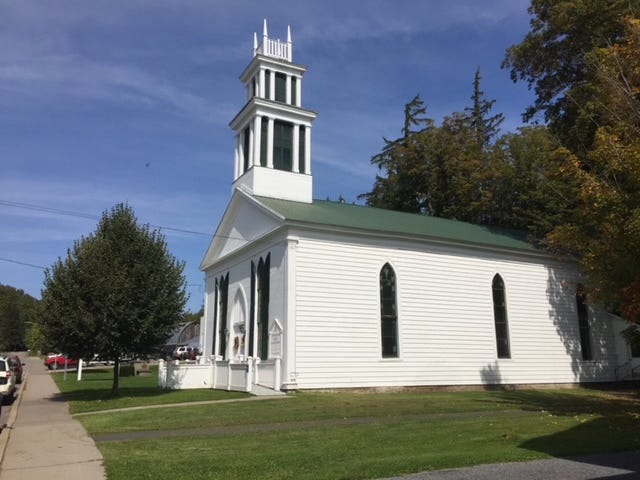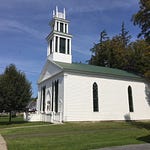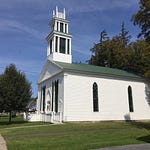Dear Friends,
I trust you’ve had a blessed April, and a very happy May 1st to you all!
Sadly, as I write to you this morning, thousands continue to die in Ukraine, Israel is being attacked on multiple fronts, and our university campuses are erupting with the ancient hatred of antiSemitism. But the “Ancient of Days” remains faithful, so, for today, a simple reminder that Christ and His Word are sovereign.
As prompted by the Spirit, many of you are in my daily prayers. I love calling you out by name, knowing of your faithfulness and God’s unstinting faithfulness to you. As we begin year two of writing and podcasting The Church’s One Foundation, know that your prayers for me are a gift I cherish.
Do enjoy this beautiful spring and joyous Easter season. He is risen! He is risen indeed!
With Deepest Thanks for You!
D. Paul
“SIR, WE WOULD SEE JESUS”
If you were brought up in the Church two or more generations ago, the chances are good that you were taught the Bible, and the Bible back then was always spelled with a capital “B.” Its presence was a constant in your life: you heard it declared from the pulpit; your Sunday School teacher spotlighted its dramatic stories; your parents read it in the home, often before dinner or at bedtime. You were probably given a Bible at a young age, perhaps a New Testament Red Letter Edition that highlighted the words of Jesus, whose teachings you not only knew, but were expected to follow. Not even the lazy days of summer were exempted, with a Vacation Bible School on every other corner in town. In-between the Kool-Aid, cheese & crackers, and the ritualized singing of “The B-I-B-L-E, Yes, that’s the book for me,” you would study the “Good Book” for a week or two, providing your mother with a well-deserved break from the frenetic kids playing “Kick the Can” in the backyard.
Soon, as you entered adolescence, you may have found yourself participating in local, state, or national bible quizzes, the Church’s equivalent to the National Spelling Bee competitions. It was not enough to know the Matthew 6:33 of the King James Bible—“But seek ye first the Kingdom of God, and his righteousness; and all these things shall be added unto you”—but, with hand raised, you had to be the quickest one out of your seat—agility of mind and limbs a prerequisite for victory. But the prize was worth the effort—the Living Bible—a newly published, 1967 New Testament translation that discarded the anachronistic, albeit majestic language of the King James Version. It felt swell to know you were keeping up to date!
By this time, you may have been looked upon as something of a religious “oddball,” one of those uncool Christian kids who carried their Bibles to school and had the temerity to share their faith on school premises. Any ridicule mattered little to you, for sealed in your heart was one of those inspiring Bible quiz verses: “For I am not ashamed of the gospel of Christ: for it is the power of God unto salvation to every one that believes; to the Jew first, and also to the Greek” (Romans 1:16, KJV). And even though you knew few Jews and even fewer Greeks, hands down, the Bible was the most important book in your life—your North Star, your moral compass, and theologically, unbeknown to you, your guiding, doctrinal principal—Sola scriptura—by scripture alone. And so it was for millions of Americans a generation or two or three ago. But, as Bob Dylan wrote in the ‘60s, “The Times They Are a-Changin,’” and changed they have indeed.
Do young people (unless they’re attending a private, religious school) ever carry a Bible to school anymore? I would think they are few and far between. Temerity has been replaced by timidity. With church membership dwindling and more and more young people identifying as “spiritual” rather than religious, countless youth are being raised without an ounce of religious education. They neither own a Bible nor have they ever read one—its inspirational stories, probing parables, its grand Judeo-Christian metanarrative, and its timeless teachings are totally unknown to them. They are among the growing, biblically illiterate, more likely to know the latest Pokémon video game than any reference to the Gospels. Ironically, Dylan’s own song climaxes with a biblical reference, Dylan singing, “And the first one now will later be last,” paraphrasing the Gospel of Mark’s, “But many that are first shall be last, and the last first” (Mark 10:31, KJV). Time and again, Dylan’s songs reflect the great themes found in the “Book of Books.”
The Bible’s influence upon our culture and that of Western civilization cannot be exaggerated. I wonder: would there have been a Shakespeare without the Bible? Certainly not the Bard of Avon we know. Drawing heavily upon the Geneva Bible, there are over 1,300 identifiable quotes or references Shakespeare used that come from 42 different books of the Bible. For all the playwright’s purported philandering, he knew Scripture well and attended church faithfully. When one kneels for Holy Communion at the altar of Holy Trinity Church, Stratford-upon-Avon, where Shakespeare attended, was baptized, and buried, his tomb is only a few feet behind the alter in the chancel, its visible plaque bearing that God-fearing inscription: “Good friend, for Jesus’ sake forbear to dig the dust enclosed here. Blessed be the man that spares these stones, And cursed be he that moves my bones.” From Chaucer to Flannery O’Conner, from the profound writings of Lincoln to the poetry of T.S. Eliot, from Faulkner to the novels of Marilynne Robinson, the Bible has served as an incomparable guide and inspiration for our culture. Arguably, as the literacy of a country goes, so goes its culture. Hardy surprising, then, that 85% of juveniles in the US court system are functionally illiterate—unable to read and with no biblical, moral compass to guide them.
Though often ignored, in Shakespeare’s day church attendance was compulsory; today, less than 5% of England's population attend a house of worship, with many of the great cathedrals a shadow of their once vibrant selves. While America’s church attendance has not dropped as precipitously, membership continues a steady decline, with many churches offering little if any biblical education. Today’s “softball” sermons are usually reduced to a first-person narrative, seasoned along the way by a humorous anecdote or two, then climaxing in the “gospel according to” Anne LaMott or Brian McLaren or another “agreeable” author, whose theology and politics scratch the “itching ears” of the congregation. As for the youth? One “Deep Community” of faith, as they immodestly bill themselves, recently offered a “Forest Bathing” experience, positing Richard Rohr's concept that “Nature was the first Scripture”—a highly debatable supposition—with no mention of whether or not swimsuits were optional.
Ah, forgive the sarcasm, dear friends, if not my simplicity, for speaking anecdotally (yes, mea culpa, me culpa), I’m reminded of the church that grew tired of its pastor regaling them with his three-point, “I-I-I” centered sermons, finally telling him, even as the inquiring Greeks told Philip of Bethsaida, “Sir, we would see Jesus!” (John 12:21, KJV).
Conspicuously absent from today’s '“gospel-light” teaching is the unadorned Jesus of the Bible, who was supremely confident in knowing that the “…words that went out of his mouth would not return to him empty, but would accomplish what He desired and achieve the purpose for which they were sent” (Isaiah 55:11 NIV; author’s paraphrase), and who was certain, along with the author of Hebrews, that “…the word of God is quick, and powerful [living and active], and sharper than any two-edged sword…a discerner of the thoughts and intents of the heart” (Hebrews 4:12, KJV).
It is this word—the Word of the Lord—that a broken world cries out for: not a modified Christ, reshaped in our own image; not a diminished Christ, stripped of his power—but a Christ who authoritatively tells us that He is “the way, the truth, and the life,” and promises us that if “… I, if I be lifted up from the earth, [I] will draw all men unto me (John 12:32, KJV).
“Sir, we would see Jesus.” Would that every graduating seminarian, lay preacher, evangelist, and we few and feeble “dramavangelists,” and every follower of Jesus subscribe to that simple admonition. May we decrease; may He increase. And may we, like Paul of old, determine “not to know anything…except Jesus Christ and Him crucified,” the Christ, who is “…the power of God and the wisdom of God!” (I Corinthians 2:2, NKJV; I Co 1:24, NIV).
Amen
“The Church’s One Foundation Is Jesus Christ Her Lord!”
William Shakespeare’s church—Holy Trinity Church, Stratford-upon-Avon















Share this post